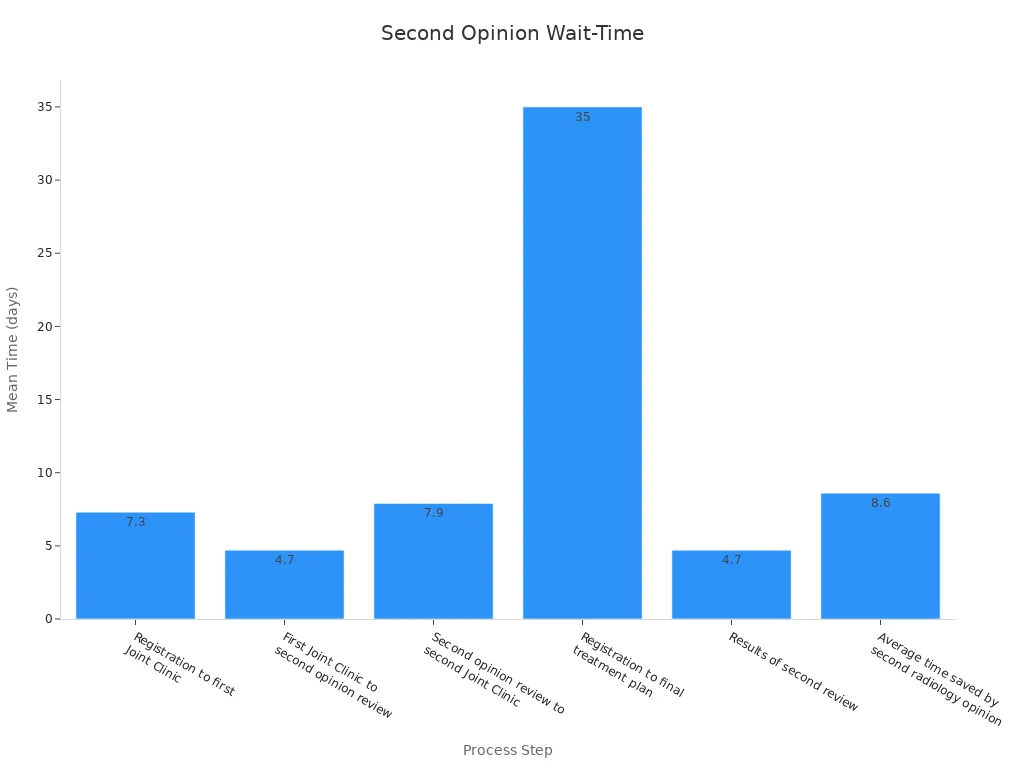Top Reasons to Seek a Second Opinion for Cancer Care

Receiving a cancer diagnosis can be overwhelming, but navigating second opinions: why and how to seek them out is an essential step toward gaining clarity and reassurance. Seeking a second opinion helps ensure you receive the most accurate diagnosis and the best possible treatment plan. Research indicates that between 23% and 57% of patients experience significant changes in their care after consulting another specialist, often leading to improved outcomes and fewer unnecessary treatments. Moreover, about one-third of patients who forgo a second opinion miss out on appropriate care, which can adversely affect their health. For individuals facing complex cases, navigating second opinions becomes even more crucial, as it provides access to advanced options and cutting-edge therapies. Taking this proactive step empowers you to make well-informed decisions about your health.
Key Takeaways
Getting a second opinion can double-check your cancer diagnosis and plan.
It may lead to better treatments and access to new therapies.
Talking to experts helps you learn more about your cancer type.
This can make you feel sure about your choices and care team.
To prepare, collect your records, list questions, and talk to your doctor.
Cancer Diagnosis-Navigating Second Opinions: Why and How to Seek Them Out

What is a second opinion in cancer care
A second opinion in cancer care involves consulting another specialist to review your diagnosis and treatment plan. It ensures that your diagnosis is accurate and your treatment options are comprehensive. You can openly discuss your intention to seek a second opinion with your physician, who can assist by providing necessary medical records. Preparing a checklist for scheduling your second opinion helps streamline the process. This checklist might include confirming health insurance coverage, determining if a referral is needed, and bringing someone to the appointment to take notes and ask questions.
Why second opinions are a standard practice in cancer treatment
Second opinions have become a standard practice because they often lead to better outcomes. Research shows that 54% of patients experience significant treatment changes after seeking a second opinion, especially for advanced-stage cancers like prostate and breast cancer. These changes might include updated treatment options, access to clinical trials, or even recommendations to avoid unnecessary procedures.
Study Source | Percentage of Treatment Changes | Key Findings |
|---|---|---|
JCO Oncology Practice | 54% | Hormonal intensification for metastatic prostate cancer; genomic testing for breast cancer. |
Stanford University | 64% (Stage II) | Major changes in treatment plans for advanced-stage cancers. |
Seeking a second opinion provides peace of mind and ensures you receive the most effective care for your condition.
The role of specialists in providing second opinions
Specialists play a critical role in delivering reliable second opinions. A study led by UCLA researchers found that second opinions from board-certified pathologists or subspecialty-trained dermatopathologists significantly improve the accuracy of melanoma diagnoses. Misclassification rates were lowest when specialists provided the second opinion, highlighting their importance in effective treatment planning.
Patients often report increased confidence in their treatment plans after consulting specialists. This confidence leads to better adherence to recommendations and enhances the overall cancer care experience. Specialists also educate patients and oncologists, ensuring everyone involved has a deeper understanding of the diagnosis and treatment options.
By seeking a second opinion, you gain access to expert insights that can confirm your diagnosis, refine your treatment plan, and provide reassurance during your cancer care journey.
Top Reasons to Seek a Second Opinion

Confirming the accuracy of your diagnosis
A second opinion can help confirm whether your cancer diagnosis is accurate. Even highly skilled doctors can interpret test results differently, especially for rare or complex cancers. Consulting another specialist ensures that your diagnosis is reviewed from a fresh perspective, reducing the risk of misdiagnosis.
Studies have shown the significant impact of second opinions on treatment decisions:
A study at MSK involving 120 patients revealed that even when the original diagnosis was confirmed, treatment recommendations changed for some patients.
Approximately 1 in 3 patients experienced a change in treatment, often leading to less intense therapies that improved their quality of life.
About 1 in 5 patients were advised to undergo no surgery or less surgery than initially planned.
1 in 10 patients were told they did not need any treatment and could simply be monitored.
These findings highlight how a second opinion can refine your treatment plan, ensuring it aligns with your specific needs. By confirming your diagnosis, you gain clarity and confidence in the path forward.
Exploring advanced or alternative treatment options
A second opinion opens the door to exploring advanced or alternative treatment options. Different specialists may recommend unique approaches based on their expertise or access to innovative therapies. This can be especially valuable if your current treatment plan feels limited or if you want to explore less invasive options.
Patients often seek second opinions for reasons such as the need for certainty, lack of trust in the initial diagnosis, or a desire for personalized care. In many cases, discrepancies between the first and second opinions reveal new treatment possibilities. For example:
You might learn about therapies that were not initially discussed.
A second opinion could connect you with clinical trials offering cutting-edge treatments.
Specialists may suggest alternative approaches tailored to your specific cancer type and stage.
By seeking a second opinion, you ensure that you are aware of all available options, empowering you to make informed decisions about your care.
Gaining access to clinical trials and cutting-edge therapies
Second opinions can also provide access to clinical trials and the latest advancements in cancer care. Specialists at leading cancer centers often have knowledge of ongoing trials and experimental treatments that may not be widely available. These opportunities can be life-changing, especially for patients with rare or advanced cancers.
When you consult a specialist for a second opinion, they may identify clinical trials that match your diagnosis and treatment goals. These trials often test groundbreaking therapies, such as immunotherapy or targeted treatments, which could offer better outcomes than standard care. Additionally, specialists can guide you through the eligibility process, ensuring you meet the criteria for participation.
Exploring clinical trials through a second opinion not only expands your treatment options but also gives you access to the forefront of cancer research. This proactive step can make a significant difference in your journey toward recovery.
Understanding your cancer type and stage in greater detail
Understanding your cancer type and stage is critical for making informed decisions about your care. A second opinion can provide deeper insights into these aspects, helping you grasp the specifics of your diagnosis. Specialists often use advanced diagnostic tools and techniques to refine staging accuracy, which can significantly impact your treatment plan.
Quantitative multimodality imaging, such as PET-CT, has proven to be highly effective in diagnosing and staging various cancers. For example, it offers better lesion localization and distinguishes between benign and malignant growths more accurately than standalone PET scans. This precision is particularly beneficial for cancers like non-small-cell lung cancer and colorectal cancer, where accurate staging is essential for determining the best course of action.
Metric | Description |
|---|---|
Heatmap illustrating accuracy across diseases | |
AJCC Stage Identification Metrics | Quantitative metrics for accuracy assessment |
AJCC Stage F1-Score Metrics | F1-score metrics for evaluating model performance |
In addition, recent advancements in AI-driven diagnostic models have shown remarkable accuracy in staging cancers. For instance:
The fine-tuned GPT-4o-mini model achieved a mean accuracy of 99%.
The instruction-tuned Llama3.1 model achieved a mean accuracy of 96%.
These tools, combined with the expertise of a second-opinion specialist, ensure that you receive the most precise diagnosis possible. This level of detail can help you understand the nature of your cancer and the rationale behind your treatment options.
Tip: Ask your second-opinion specialist to explain your cancer type and stage in simple terms. This will help you feel more confident and informed as you move forward with your care.
Building confidence and peace of mind in your treatment plan
A second opinion can do more than refine your diagnosis—it can also provide the reassurance you need to move forward with confidence. Knowing that another expert has reviewed your case and confirmed your treatment plan can alleviate doubts and reduce anxiety.
Patients often report feeling more empowered after seeking a second opinion. It allows you to clarify your role in decision-making and ensures that your preferences are considered. For example:
You may discover that your original treatment plan is the best option, giving you peace of mind.
Alternatively, you might learn about new approaches that align better with your goals and values.
Research shows that 15% to 28% of cancer diagnoses are incorrect or incomplete. A systematic review found that second opinions changed the diagnosis or treatment plan in 2% to 51% of cases. These statistics highlight the importance of seeking a second opinion to ensure your care is on the right track.
"The confidence factor patients need as they start down a long journey of treatment makes a big difference in their outcome. If they’re constantly in doubt, anxious and second-guessing themselves, all kinds of complications can arise from that."
By seeking a second opinion, you gain confidence not only in your treatment plan but also in your cancer care team. This trust can improve your mental well-being and help you stay focused on your recovery.
How to Seek a Second Opinion
Steps to take when requesting a second opinion
Requesting a second opinion involves several key steps to ensure you receive the most accurate diagnosis and treatment plan. Following a structured approach can make the process smoother and more effective:
Discuss your decision with your current doctor: Let your doctor know you’re considering a second opinion. Most physicians understand the importance of this step and will support your decision.
Gather your medical records: Collect all relevant documents, including radiology images, pathology reports, operative notes, and your current treatment plan. Many hospitals offer online portals to access these records easily.
Identify a specialist or cancer center: Research oncologists or facilities that specialize in your type of cancer. Look for board-certified specialists or centers known for treating high volumes of cancer patients.
Prepare your questions: Write down specific questions about your diagnosis, treatment options, and potential alternatives. This ensures you address all your concerns during the consultation.
Schedule the consultation: Contact the new specialist or cancer center to set up an appointment. Confirm that they’ve received your medical records before the visit.
Review the second opinion: After the consultation, compare the new recommendations with your original treatment plan. If the opinions differ, discuss the rationale behind each with both doctors.
Tip: If you’re unsure about the second opinion, consider seeking a third opinion, especially from a specialist in your specific cancer type.
Communicating with your current doctor about your decision
Talking to your current doctor about seeking a second opinion can feel intimidating, but open communication is essential. Most doctors appreciate patients who take an active role in their care. Here are some strategies to help you navigate this conversation:
Be honest and respectful: Explain that you value their expertise but want to explore all options to ensure the best possible care.
Ask for their support: Many doctors will help by recommending another specialist or providing your medical records.
Focus on your health goals: Emphasize that your decision is about making informed choices for your treatment, not questioning their abilities.
Note: Studies show that patients feel more satisfied when doctors address their individual concerns rather than relying solely on general statistics. If your doctor seems hesitant, remind them that second opinions are a standard practice in cancer care.
Effective communication also involves setting the tone for the consultation. For example, sitting down during discussions can create a more open and empathetic atmosphere. This approach fosters trust and ensures your concerns are heard.
Finding the right specialist or cancer center
Choosing the right specialist or cancer center for a second opinion is crucial. The right choice can provide access to advanced treatments, clinical trials, and a multidisciplinary team of experts. Consider the following criteria when making your decision:
Board-certified oncologists: Specialists with board certification meet rigorous standards and stay updated on the latest medical advances.
Cancer centers or teaching hospitals: These facilities often lead in research and innovation, offering cutting-edge therapies and clinical trials.
Specialization: Look for oncologists who focus on your specific type of cancer. For example, a breast cancer specialist will have deeper insights into treatment options for that condition.
Comprehensive care: Choose a center that offers a multidisciplinary tumor board, where experts from various fields collaborate on treatment plans.
Criteria | Benefits |
|---|---|
Board-certified oncologists | Ensures expertise and up-to-date knowledge. |
Teaching hospitals | Provides access to clinical trials and innovative treatments. |
Multidisciplinary tumor board | Offers collaborative opinions for more personalized care. |
Did you know? In a study of 200 cases, second opinions led to changes in interpretation for 28% of patients, with major management changes in 13% of cases.
When researching specialists or centers, check if they accept your insurance and confirm coverage for second opinions. You can also ask about support services, such as patient navigators, who can guide you through the process.
By taking these steps, you can find a trusted expert who will help you make the best decisions for your cancer care.
Preparing for your second opinion appointment
Preparing for a second opinion appointment can feel overwhelming, but taking a few simple steps can help you make the most of your visit. Proper preparation ensures that you get the answers you need and feel confident about your next steps. Here’s how you can get ready for this important meeting.
Organize Your Medical Records
Start by gathering all your medical records. These include pathology reports, imaging scans, biopsy results, and treatment plans. Having these documents ready allows the specialist to review your case thoroughly. Many hospitals provide online portals where you can download your records. If you’re unsure what to bring, ask the specialist’s office for a checklist.
Tip: Keep your records in a folder or binder for easy access. Label each section to stay organized during the appointment.
Prepare a List of Questions
Write down the questions you want to ask during the consultation. Focus on topics like your diagnosis, treatment options, and potential side effects. This list ensures you don’t forget anything important during the discussion.
Examples of questions to consider:
Are there alternative treatments for my condition?
What are the risks and benefits of the recommended treatment?
Should I consider participating in a clinical trial?
Studies show that preparing questions in advance improves the quality of discussions with doctors, especially on sensitive topics.
Confirm the Purpose of Your Visit
Clarify why you’re seeking a second opinion. Are you looking to confirm your diagnosis, explore new treatment options, or gain access to clinical trials? Knowing your goals helps you and the specialist focus on what matters most.
"Studies indicate that visit preparation interventions can improve the number and quality of questions patients ask, particularly regarding sensitive topics."
Bring a Support Person
Consider bringing a trusted friend or family member to your appointment. They can help take notes, ask additional questions, and provide emotional support. Having someone by your side ensures you don’t miss any critical details.
Note: Let your companion know what role you’d like them to play during the visit. This could include listening quietly, asking questions, or helping you process the information afterward.
Use a Checklist for Preparation
A checklist can simplify the preparation process and ensure you don’t overlook anything. Many patients find electronic or paper-based checklists helpful for organizing their thoughts and gathering essential information.
Review your medical records and bring them along.
Prepare a list of questions to ask.
Decide who will accompany you for support.
Check if the specialist’s office requires any additional forms or documents.
Some cancer centers even offer educational resources or training sessions to help patients prepare for their appointments. These tools can make you feel more confident and informed.
Review Your Current Treatment Plan
Before your appointment, take time to review your current treatment plan. Understanding what has already been recommended helps you compare it with the new specialist’s suggestions. This comparison can highlight differences and guide your decision-making process.
By following these steps, you’ll feel more prepared and empowered during your second opinion appointment. Taking the time to organize your thoughts and materials ensures you get the most out of this critical step in your cancer care journey.
Common Concerns About Second Opinions
Will my doctor be upset if I seek a second opinion
You might worry that seeking a second opinion could upset your doctor. However, most doctors understand that this is a common and important step in cancer care. They want you to feel confident in your treatment plan. In fact, many physicians encourage second opinions because they know it can provide reassurance and clarity.
A survey revealed that the majority of patients seek second opinions for reassurance rather than distrust of their doctor. Here are some key findings:
Most patients want to ensure all treatment options are explored.
Only 28% of patients reported not liking or trusting their oncologist.
31% feared offending their doctor by seeking a second opinion.
Concern Type | Percentage (%) |
|---|---|
Patients did not seem to like or trust their oncologist | 28 |
Communication with the first oncologist was unsatisfactory | 44 |
Fear of offending the oncologist by seeking a second opinion | 31 |
Came for a second opinion without complete medical records | 45 |
Doctors recognize that cancer is a life-changing diagnosis. They know you need to feel confident in your care. Open communication with your doctor can help ease any concerns about seeking a second opinion.
Does insurance cover second opinions for cancer care
Insurance coverage for second opinions varies, but many plans include this as part of their benefits. It’s important to check with your insurance provider to confirm what is covered. Some plans may require a referral from your primary doctor, while others allow you to schedule directly with a specialist.
If your insurance does cover second opinions, it may include consultations with oncologists, pathologists, or radiologists. However, coverage might differ for out-of-network providers. To avoid unexpected costs, ask your insurance company these questions:
Is a referral required for a second opinion?
Are there specific specialists or centers I must visit?
What costs will I need to pay out of pocket?
Many cancer centers have financial counselors who can help you navigate insurance questions. Taking the time to understand your coverage ensures you can focus on your care without added stress.
How long does it take to get a second opinion
The time it takes to get a second opinion depends on factors like the specialist’s availability and the complexity of your case. On average, the process can take a few days to several weeks.
Here’s a breakdown of typical wait times:
Description | Mean Time (days) | Range |
|---|---|---|
Registration to first Joint Clinic | 7.3 | 1-30 |
First Joint Clinic to second opinion review | 4.7 | 1-17 |
Second opinion review to second Joint Clinic | 7.9 | 1-90 |
Registration to final treatment plan | 35 | 1-240 |
Results of second review | 4.7 | 1-7 |
Average time saved by second radiology opinion | 8.6 | 3-31 |

While waiting for a second opinion, you can use the time to gather your medical records and prepare questions for the specialist. This preparation ensures you make the most of your appointment.
Tip: If your case is urgent, let the specialist’s office know. Many centers prioritize patients with immediate needs.
What if the second opinion differs from the first
When a second opinion differs from the first, it can feel confusing or even overwhelming. However, these differences often provide valuable insights that can improve your care. Specialists may interpret imaging, pathology, or test results differently based on their expertise or access to advanced diagnostic tools. For example, a study on breast cancer diagnoses found that second opinions frequently revealed discrepancies in imaging and pathology interpretations. These differences sometimes led to alternative treatment recommendations that better suited the patient’s condition.
If you encounter conflicting opinions, start by understanding the reasons behind the differences. Ask each doctor to explain their findings and the rationale for their recommendations. This step helps you identify which approach aligns best with your health goals and personal preferences. You might also consider consulting a third specialist to gain additional clarity.
Second opinions often highlight new or alternative treatment options. A systematic review showed that patient-initiated second opinions frequently resulted in updated diagnoses or revised treatment plans. This process underscores the value of seeking multiple perspectives, as it ensures you explore all possible avenues for your care.
Tip: Keep an open mind when reviewing differing opinions. Each specialist brings unique expertise, which can uncover opportunities you might not have considered.
Ultimately, differing opinions empower you to make informed decisions about your treatment. They encourage collaboration between specialists, leading to a more comprehensive and personalized care plan. By embracing these differences, you take an active role in shaping your cancer care journey.
Seeking a second opinion empowers you to take control of your cancer care. It helps you explore treatment options, confirm your diagnosis, and find a doctor who aligns with your preferences. You gain peace of mind knowing experts have reviewed your case.
You become more informed about your health and treatment choices.
You access advanced therapies that may not be available elsewhere.
You receive tailored care that matches your needs.
A second opinion ensures you make decisions with confidence, giving you the best chance for recovery.
FAQ
What should you do if your doctor disagrees with your decision to seek a second opinion?
Most doctors support second opinions, but if yours disagrees, explain your reasons calmly. Emphasize that you want to explore all options for your care. If needed, seek advice from patient advocates or hospital administrators to ensure your rights are respected.
Tip: Remember, seeking a second opinion is your right as a patient.
Can you request a second opinion for rare cancers?
Yes, second opinions are especially valuable for rare cancers. Specialists with experience in your specific type can offer insights into advanced treatments or clinical trials. They may also confirm your diagnosis using cutting-edge diagnostic tools.
Note: Rare cancers often require expertise from specialized cancer centers.
How do you choose between conflicting second opinions?
Compare the reasoning behind each recommendation. Ask both doctors to explain their findings and treatment plans. Consider consulting a third specialist for clarity. Focus on the approach that aligns with your health goals and values.
Tip: Keep an open mind and prioritize your comfort with the treatment plan.
Is it possible to get a second opinion remotely?
Yes, many cancer centers offer telemedicine consultations. You can share your medical records electronically and discuss your case with specialists via video calls. This option saves time and provides access to experts outside your local area.
Emoji: 🌐 Remote second opinions expand your access to world-class care.
Will insurance cover second opinions for out-of-network specialists?
Coverage varies by plan. Some insurers cover out-of-network consultations, while others require you to stay within their network. Contact your provider to confirm coverage and ask about potential out-of-pocket costs.
Question | Answer |
|---|---|
Referral required? | Check with your insurer. |
Out-of-network coverage? | Varies by plan. |
Tip: Ask your cancer center about financial counselors for guidance.
See Also
Recognizing Symptoms And Treatment Options For Duodenal Cancer
Key Symptoms And Treatment Approaches For Conjunctival Melanoma
Exploring Symptoms And Causes Associated With Anal Cancer
Identifying Symptoms And Causes Related To Esophageal Cancer
Essential Information Regarding Basaloid Squamous Cell Lung Cancer

